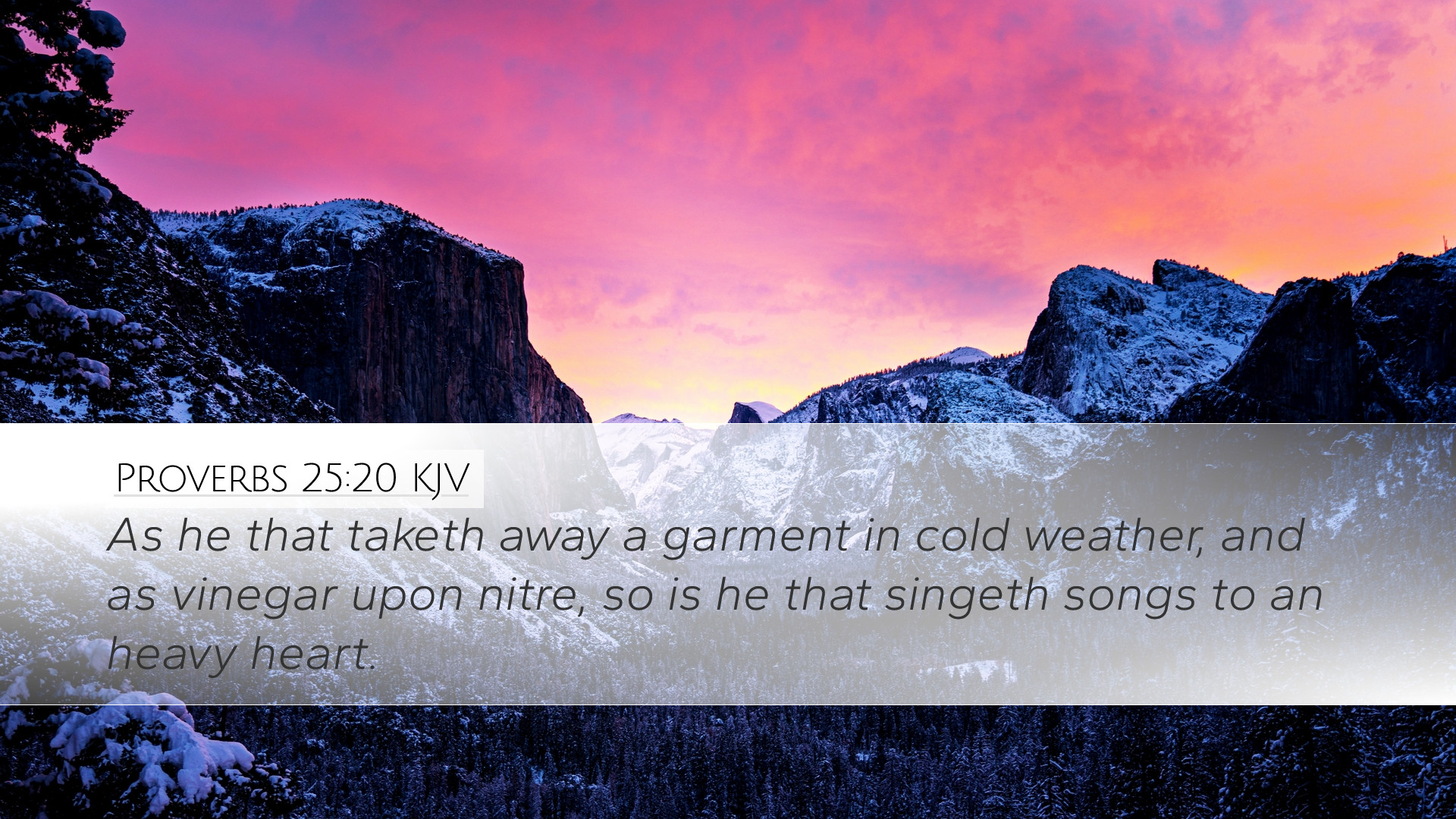Commentary on Proverbs 25:20
Verse: "As one who takes away a garment on a cold day, and like vinegar on soda, is one who sings songs to a heavy heart." (Proverbs 25:20)
Introduction
This proverb presents a vivid metaphor illustrating the futility or insensitivity of singing cheerful songs to someone who is experiencing sorrow. The insights from public domain commentaries such as those by Matthew Henry, Albert Barnes, and Adam Clarke provide valuable perspectives that deepen our understanding of this verse, its cultural context, and its theological implications.
Understanding the Metaphors
The metaphor of taking away a garment on a cold day reflects a profound insensitivity to the needs of others. Similarly, vinegar reacting with soda creates a violent effervescence, suggesting an inappropriate response to the serious nature of a heavy heart.
- Garments: Represents comfort and protection. To remove a garment from one who is cold is to strip away their defense against the elements.
- Vinegar and Soda: This reaction symbolizes a response that is both ineffective and potentially harmful, illustrating the misalignment of actions taken in the presence of grief.
Matthew Henry's Insight
Matthew Henry emphasizes the need for sensitivity towards those who are suffering. He suggests that singing to a heavy heart can be as harmful as removing warm clothing from someone in distress. He notes that true compassion requires understanding the weight of another's sorrow.
Henry asserts, "Songs in a time of heaviness are both unseasonable and vexatious; they are ill-timed by instance and also offend the heart of the sufferer." He articulates that we need to approach the grieving with empathy rather than superficial cheerfulness.
Albert Barnes' Perspective
Albert Barnes further elaborates on this proverb by indicating that the happier expressions or songs can seem mocking to someone who is deep in sorrow. He observes that the attempt to bring joy through such expressions can feel like a dismissive act toward their genuine feelings.
Barnes notes that a person's grief requires acknowledgement and understanding rather than forced cheer. He explains that “there is a time to weep and a time to laugh,” and reminds the reader of the wisdom in recognizing the appropriateness of responses in various emotional landscapes.
Adam Clarke's Analysis
Adam Clarke articulates the idea that this proverb cautions against being oblivious to the emotional state of others. Clarke aligns singing songs with superficiality and notes how it contradicts the earnestness required during someone’s state of despair.
He advocates for thoughtful engagement with expressions of grief, stating that “the man who gives his poor neighbor songs of joy, when he is mourning and in bitterness of soul, is as unwise as he is cruel.” His analysis reflects the need for discernment in our interactions with those who are suffering.
Theological Application
This proverb invites a deeper theological reflection on compassion and ministry. For pastors and theologians, it serves as a reminder of the pastoral calling to minister to the heart of those in sorrow:
- Compassion: It underscores the importance of being sensitive to the emotional states of others, allowing space for grief.
- Discernment: It calls for discernment in pastoral care, encouraging leaders to be aware of the appropriateness of their words and actions amidst grief.
- Empathy: Enhances the theological understanding of the incarnation, where Christ identifies with human suffering, teaching us to enter into the pain of others.
Conclusion
Proverbs 25:20 compellingly illustrates the need for discernment and compassion when interacting with those who carry burdens of sorrow. The insights from respected commentaries provide a robust framework for applying this wisdom to our lives, particularly in pastoral care and everyday interactions. Learning to engage sensitively with the emotional experiences of others can greatly enhance our ministry and relationships.


